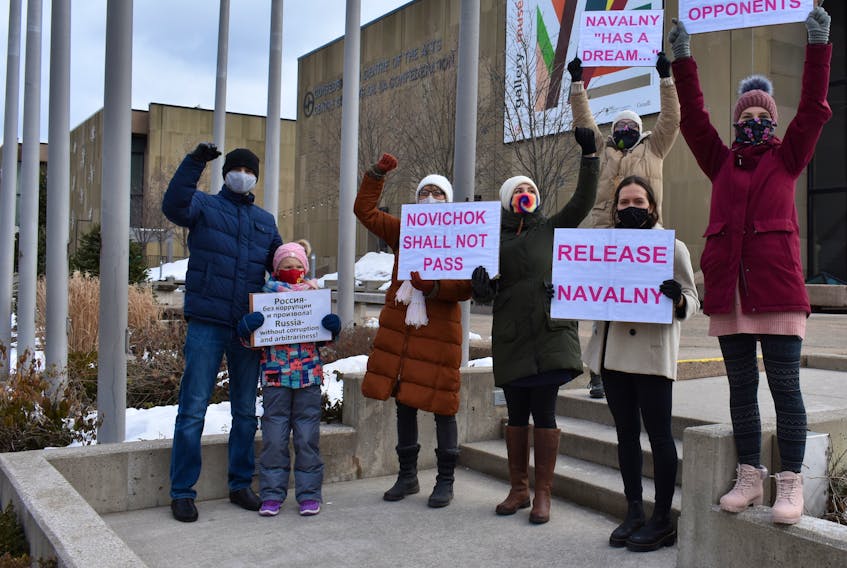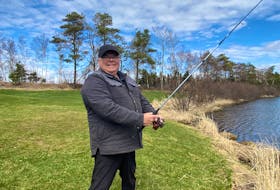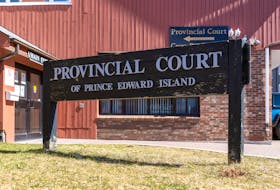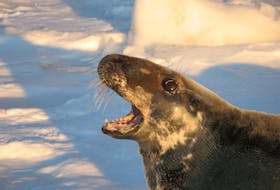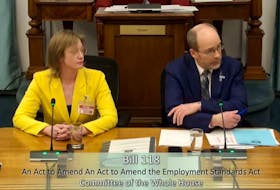CHARLOTTETOWN, P.E.I. — Maria Skrigolovskaya was proud of those she knew back in Russia on Saturday morning as she watched videos she received from former classmates in Moscow.
The videos showed thousands of people participating in a demonstration in Pushkin Square in Moscow, demanding the release of Alexei Navalny, an opponent of Russian President Vladimir Putin. Navalny was jailed upon his return to the country last weekend.
Skrigolovskaya was also scared.
Later that morning, she was one of seven people who gathered in downtown Charlottetown to show their support for people protesting in Moscow.
“I can’t say we are big Navalny fans, we’re not, it’s just a shame what’s going on,” she said. “You can be poisoned, you can be killed because of your position.”
Who is Alexei Navalny?
Alexei Navalny was born on June 4, 1976, in Butyn, a village west of Moscow, and grew up in Obninsk, a town 100 kilometres south-west of Moscow.
He has been an ardent opponent of President Vladimir Putin and his government and rose to prominence in 2008 when he started blogging about alleged corruption in state-controlled corporations.
Navalny, who studied law, has a prominent social media presence in Russia and operates an Anti-Corruption Foundation (FBK), which publishes investigations of the Russian government.
He has been arrested and jailed multiple times, which he said are attempts by the Russian government to silence him, but he hasn’t been swayed. He has also suffered permanent damage to one of his eyes after a caustic liquid was thrown in his face in an attack in 2017.
Navalny is the most vocal critic of Putin and his government in Russia.
After recovering in Germany from being poisoned in August, Navalny returned to Russia on Jan. 17 and was immediately detained for 30 days.
The Russian government said he was in violation of the terms of his probation related to a suspended 2014 conviction for money laundering, which Navalny says is illegitimate.
His detainment lead to massive demonstrations in Moscow and other Russian cities on Saturday demanding his release.
A report from The Associated Press said Russian police arrested more than 3,400 people in 90 cities, including Navalny’s wife, Yulia.
Skrigolovskaya has lived in P.E.I. for almost five years. She and her husband moved to Canada after the Russian invasion of Ukraine in 2014 and annexation of Crimea, she said.
“Originally, we decided to move here because we don’t agree with the Russian government and its whole aggression and anti-freedom of people in Russia," she said. "We can’t stand what’s going on.”
Daniil and Natalia Gorbachev left Russia for similar disagreements with the Russian government, but Daniil would like to see a change so that others don’t have to leave the country, he said.
“It’s sad. It’s sad. I wish people in Russia can change that, so people in Russia don’t have to make the same decision we had to make.”
Natalia was the one who organized the demonstration in Charlottetown.
“All the events happening in Russia, they touched me a lot and my family and my friends, they’re in Russia,” she said, “and I just want to show my support to all people in Russia who come to protest actions today.”
Daniil knows their gathering is unlikely to change much, but he hopes those in Russia seeing the gatherings, like the Charlottetown one, and know they aren't alone. The demonstrations could potentially garner more support among countries, like Canada, that can oppose Putin on an international level, he said.
“I know it looks like a small drop in the ocean and we’re quite far from Russia, but this may somehow show people who hesitate that they have support and that Putin’s corrupt and criminal government must go is not a crazy idea.”
Watching from P.E.I. is difficult for the Skrigolovskaya and the Gorbachevs, knowing family and friends are putting themselves in harm’s way, while they are safe in P.E.I.
“For me it’s frustrating because I can’t do much,” said Natalia. “For me, being here is my small, little drop. I really support those brave people who are going on the streets today and could be imprisoned, could be injured by police. It’s sad.”
Michael Robar is a reporter at The Guardian. He can be contacted by email at [email protected] and followed on Twitter at @MichaelRobar.

